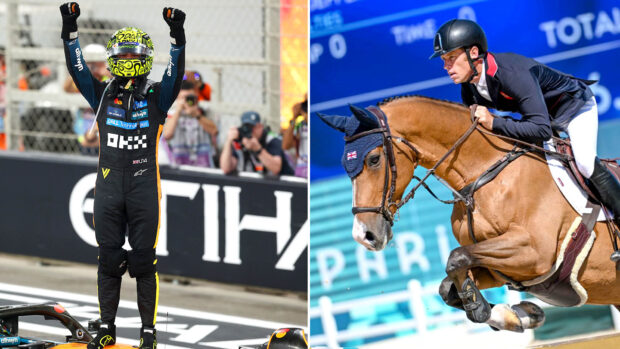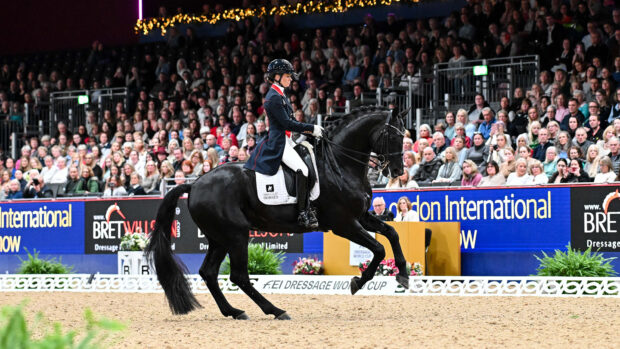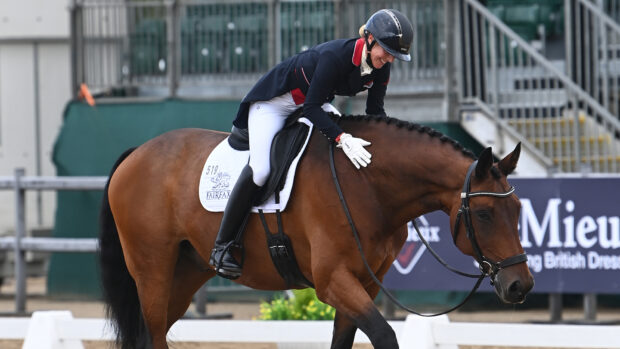Pammy Hutton FBHS, an international competitor and trainer of Olympic and Paralympic medallists, on the holy grail of dressage, terminology and coaching
HOW tricky this dressage lark is – particularly achieving the holy grail of accuracy, softness and power.
Accuracy involves attention to detail. So often a rider comes to me for help saying, “The judges just won’t give me the marks” – to which I ask, “Did you actually do what’s on the test sheet?”
Was your centre line straight? Did you show the difference between a corner and a circle? Was the circle of the right size? Did you ride on the diagonal line or did you leave late and go back early? One of my prelim pupils has raised their score massively simply by riding the test accurately.
As for softness, I have to question the overuse of rising trot. It’s becoming the norm for everything, even passage.
“Do rising trot,” they cry, “it frees the horse’s back.” Well, it might… but soon there will be no one left who teaches sitting trot to meet the requirement of prix st georges (PSG), which asks for 388 metres of it.
Rising helps with rhythm but avoids moving with the horse, thus disguising the need to sit softly while following the horse’s movement with seat bones to provide impulsion. That’s the basis of a good, established seat, through which softness is ultimately achieved.
As for power, the instruction “kick” is apparently out of bounds these days when teaching riders. So how does one say, “Please give one aid for one answer – rather than using a flapping, nagging leg” concisely? “Use a quick aid a little more meaningfully with that piece of anatomy below the knee?” doesn’t really cut it. Or how about “quick heels” to create power? Might that work?
One must ride accurately – very accurately – nowadays. I love to see and feel softness, ease and harmony; qualities deserving of reward. Yet no one goes anywhere without power. How rarely accuracy, softness and power coincide; and how magical when they do.
An exciting prospect
JOY of joys, my latest horse canters with me on grass going up our hill. Honeybrook Extra Special is a Negro mare working towards PSG and has the beginnings of piaffe, but that’s for next year.
She is currently eventing with Tom Rowland and was best British horse in the two-star event at Rockingham. But she came only second, behind Australian rider Bill Levett.
Why? Because my left hand has always shortened the left front leg in halt to half a step behind the right front. My shortlisted British team horse did it; my travelling reserve horse did it. And did I learn? Apologies, Tom; I’m on it. What was I saying about accuracy?
Teaching is a skill
“THOSE who can, do; those who can’t, teach.” What a fundamentally flawed statement. I say that unqualified people ought not to teach.
Many talented competitors regard themselves as skilled. And as riders, they probably are. Some have taken the initiative to gain a recognised teaching qualification, learning how to teach as well as already knowing what to teach.
However, those who set themselves up as coaches with no relevant education often fail to understand that every rider learns in different ways. The upshot is that some pupils are feeling demoralised and underachieving, especially if the “coach” says, “Let me show you” then proceeds to ride the horse with a competence and effect that the pupil can only dream of.
Delivering technical knowledge is a skill requiring commitment and practice. The reward is seeing any level of rider develop and achieve their long dreamed-of goals. When a rider spends a considerable sum on training, the coach owes them a commitment to want to help, not just take their money. Equally, every rider has the right to change trainers if they’re disappointed – something that’s easier said than done when the coach is talking the talk, unaware of the effect they’re having on their pupil’s increasing despair.
Most of us can drive a car competently. But could we set up as a driving instructor and train others to pass a driving test? I doubt it.
• Do you agree with Pammy that coaches should hold a qualification? Let us know at hhletters@futurenet.com
- This exclusive column will also be available to read in Horse & Hound magazine, on sale Thursday 9 June
You may also be interested in…

Alan Davies on hacking Valegro and Uthopia – and why he doesn’t like Carl and Charlotte riding them

British dressage rider swaps white boards for Love Island villa

Who is KK Woodstock? Meet the horse everyone is talking about right now

Subscribe to Horse & Hound magazine today – and enjoy unlimited website access all year round
Horse & Hound magazine, out every Thursday, is packed with all the latest news and reports, as well as interviews, specials, nostalgia, vet and training advice. Find how you can enjoy the magazine delivered to your door every week, plus options to upgrade your subscription to access our online service that brings you breaking news and reports as well as other benefits.




